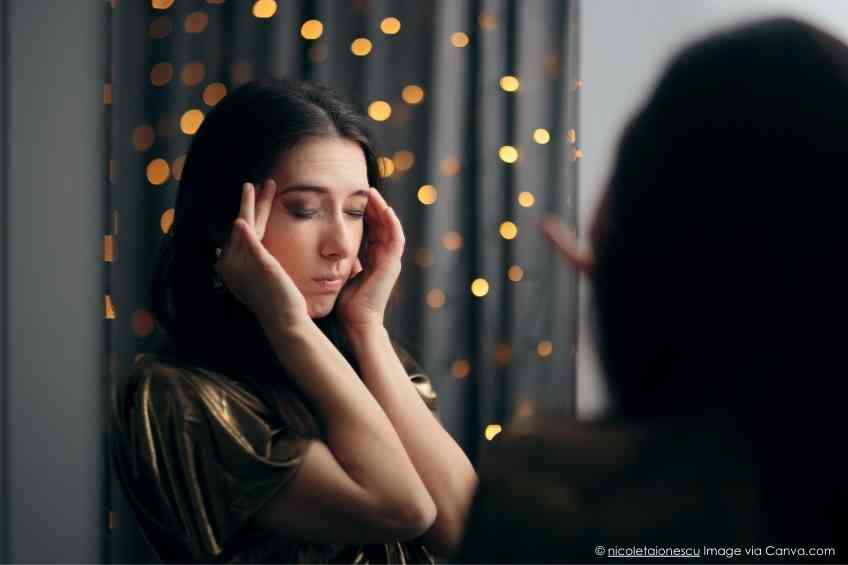Depression hits tens of millions of Americans every year. This infliction is brought on by all sorts of causes and reasons. One lesser-known trigger is the change of seasons, most noticeably in the northeast or other colder weather climes where temperature drops in autumn and the days get shorter. These seasonal shifts often lead people to exchange healthier lifestyle patterns for routines that can make them feel isolated, anxious and depressed—which in turn can result in more serious consequences. The stress of the holidays only threatens to make matters worse for many. What’s the solution? Dr. Gregory Scott Brown believes recognizing the signs of seasonal depression and trying to deal proactively with the triggers can go a long way towards helping people more effectively deal with it. He recently spoke to WellWell on how to unwrap the problem and potentially solve it. Read on.
Every year we hear about either seasonal depression or holiday depression. Is it a real problem? And if so, how big of a problem is it?
Well, it’s definitely a real problem. In fact, the American Psychiatric Association recently released a survey indicating that up to 5 percent of Americans may struggle with seasonal depression. So, we’re talking about something that potentially impacts millions of people. And when you’re talking about seasonal depression, really what you’re thinking about is depression that occurs with the seasonal pattern. If you’re noticing depressed mood, low energy, maybe you’re not sleeping as well, sleeping too much, feelings of worthlessness or not really being interested in the things that you once were interested in for at least two weeks, then that might meet the criteria for major depression. Now, if you’re experiencing those symptoms at the same time of year, multiple years in a row, that would indicate potentially meeting the criteria for seasonal depression.
Are we just focused on the end of fall and autumn into winter?
It’s definitely more common that time of year. However seasonal depression can occur any time of the year. And I think it’s important to realize that some folks who live in Texas, like myself, can experience seasonal depression during the summer when it’s extremely hot outside and we’re not able to get outside as much and spend as much time in nature, so it’s something that can occur any time of the year.
Does holiday depression play a factor in this at all? I’m thinking about people in the Northeast who are seeing the seasons change and rolling into the holidays.
When you’re talking about seasonal depression, the holidays definitely can play a role there as can other factors as well. I mean the days are getting shorter. Now if we’re looking at some science here, more melatonin is produced in the brain that can cause us to feel more tired and sluggish. But if we’re looking at the holidays, there are unique stressors that come along with it. Gift giving and gift receiving can be particularly stressful for a lot of folks and then there are financial stressors that are associated with the holidays as well.
What are the deeper, potentially more dangerous problems, attached to seasonal depression?
We have to consider that there are over 140 suicides every day on average in the United States alone. Seasonal depression or depression of any type is one of the primary risk factors for suicide. On a smaller scale, if depression is beginning to interfere with one’s ability to live their life, It’s causing problems at work, It’s causing problems with their relationships and with their friendships, then I think it’s definitely something that people should talk about. No degree of depression is too small to actually talk about with someone that you trust, whether it be someone in your family or a mental health professional.
Are there certain people who are more susceptible to seasonal depression?
The important thing to realize is that everyone is at risk for depression. And so just because we may see depression occurring in higher rates in women, for example, which is something that we actually do see, men tend to die by suicide. About three to four times as often as women do. So again, if we’re looking at those statistics and saying, one group of people is more susceptible than another group of people, I think that’s a little bit misleading. Now with seasonal depression specifically, it does tend to be more common. At least get more attention in those northeastern states per se when the winters are colder and the days are a bit longer, but everyone is at risk.
Has seasonal depression always been there? Is the problem growing in any way or is it just stable meaning it’s not growing?
I suspect that this has been a problem for a very long time. If you see more people talking about their mental health and mental illness journey and you start paying more attention and people start feeling more comfortable coming out and sharing their stories with their doctors or with their family members, then you start to see those numbers and those diagnoses maybe tick up a little bit. But I suspect this has been a problem for a very long time.
Is seasonal depression different than other types of depression? We may know the cause, but is there a difference beyond the cause itself?
There really isn’t. It’s depression. Depression is depression. At least two weeks when someone is noticing depressed mood, maybe low energy changes in appetite, not getting restorative sleep, feelings of worthlessness and thoughts of suicide, that’s now the distinguishing factor. What makes it seasonal depression is that it occurs with a seasonal pattern so if you’re someone who’s noticing every winter, you start to feel this way, or those symptoms go away when spring and summer come along, or every summer you feel this way and those symptoms go away when fall and winter roll around, that’s what would distinguish seasonal depression from other types of depression.
Given this, are you a proponent of getting rid of daylight savings time?
I think that anytime people are experiencing shorter days if they wake up in the morning and it’s dark outside or when they get home from work and it’s dark outside again. In the absence of sunlight, your brain releases more melatonin which can cause us to feel sluggish and tired and maybe experience more brain fog, which can exacerbate feelings of depression. I’m not a proponent for or against daylight savings time per se, but I think it’s definitely something that we have to be mindful of as our days are getting shorter.
In your book, The Self-Healing Mind, you discuss how to deal with depression, anxiety and a number of other mental health issues. How do we deal with seasonal depression? Is it the same way we would deal with other forms of depression?
If someone is experiencing seasonal depression during the fall and the winter, there’s some good evidence indicating that sitting with a lightbox in the morning when you have your cup of coffee or tea for 30 minutes to an hour every day may actually help. Some psychiatrists are recommending this for their patients. We have certain medications that have also been studied and found to help with seasonal depression like Wellbutrin or Bupropion. But I think the other thing is if you are someone who’s insightful and is able to recognize some of those triggers, maybe gift giving or gift receiving is one of your triggers, then maybe it’s time to have a game of white elephant instead of exchanging gifts during the holidays. Little things like that which may seem inconsequential can actually make a big difference. We know again the benefits of self-care strategies like moving our body, exercise and physical activity, meditation and making sure that we’re eating nutrient-dense meals. If you know that you’re more prone to experiencing seasonal depression, it’s a good opportunity to really pay attention to some of those self-care strategies.
What else people should always be on the lookout for or be mindful of in their lifestyle?
When it comes to activity, being outside is more difficult when it’s darker outside, when it’s cold and when it’s raining, similar to how it’s more difficult for me being in Texas spending a lot of time outside going for a run when it’s 108 degrees in the middle of July. So, that might mean modifying your exercise or your movement plan to an indoor type of activity. Following along with an online workout on YouTube or developing a meditation practice. Meditation is a great strategy and really it just requires sitting in a quiet room bringing conscious awareness to your breath and your thoughts. Maybe set a timer and start with two minutes. Maybe that’s all you can do the first time you try your meditation practice, but you’ll notice that in time it gets easier.
Does seasonal depression occur in children as well as adults?
Anyone is susceptible to experiencing depression regardless of age, geographic region, race, ethnicity or nationality. The problem can impact anyone.
What are the telltale signs you might see in someone else and they’re not aware of it?
If we know someone well and we notice a change in their behavior, that’s a sign. If they’re someone who’s normally engaging and they’re isolating more, someone’s not returning our calls or they’re not spending as much time around us as they normally do. I think it makes sense to check in on that person. We don’t necessarily have to be intrusive and just flat-out ask them. Are you depressed or are you experiencing seasonal depression? But just to ask them how they’re doing and be willing to really sit down and listen and have a conversation.
When we look at seasonal depression and holiday depression, do you feel we can tackle this with our self-awareness strategies and programs?
Anytime someone is experiencing symptoms of depression, the most appropriate thing that you can do is to talk to someone about it. And you don’t have to start off having that conversation with a psychiatrist like myself, you can talk to someone in your family or talk to a friend. But the worst thing you could do is to suffer in silence. There are self-care strategies as I outlined in my book The Self-Healing Mind. Once you’ve had that conversation with someone and perhaps even while you’re waiting to have your first appointment with the therapist, that’s a good place to start and these are strategies that can improve symptoms of depression and anxiety and also prevent us from sliding into episodes of depression.
What’s the one takeaway you’d want people to walk away with from this conversation?
You’re not alone. A lot of people are going to resonate with a lot of the things that we discussed today and again millions, tens of millions of Americans every year struggle with depression and anxiety, and millions of Americans every year struggle with seasonal depression. If you’re thinking this really sounds like me, I would just encourage you to get a conversation going with someone you trust. It might improve your life for the better.

About Dr. Gregory Scott Brown
Gregory Scott Brown is a psychiatrist and mental health writer. His commentary has appeared in the New York Times, the Huffington Post, Psychology Today, on the Today Show, and on NPR. He is an advisory board member for Men’s Health Magazine, where he regularly contributes content for mental health stories. He is also the author of The Self-Healing Mind: An Essential Five-Step Practice for Overcoming Anxiety and Depression, and Revitalizing Your Life.
Please visit gregoryscottbrown.com to learn more. The Self-Healing Mind can be purchased at Amazon.












